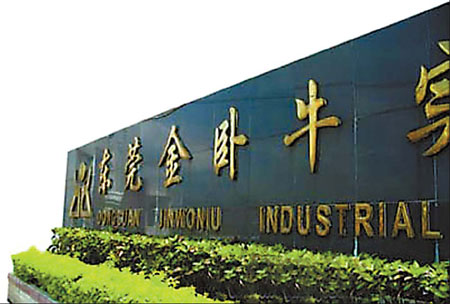


"To be or not to be?" is a question that Lu Malu has been pondering for months.
Lu is the general manger of Dongguan Jinwoniu Industrial Co, a large-scale oven producer and exporter. Founded in 1992, the company has been rated among the top 50 private companies in Dongguan, Guangdong province. It has also been the main oven supplier for Wal-Mart since 1999, with an annual transaction amount exceeding 100 million yuan.
But due to heavy debts the company had to stop production in March and the company's founder and chairman has since disappeared to avoid creditors.
"We are considering whether to apply for bankruptcy or continue struggling to operate," Lu says. According to the company's financial statement, the liability/asset ratio is as high as 95 percent, with a 230-million-yuan debt owed to its raw material suppliers.
"Because we failed at negotiating a higher sales price, we had to stop the supply to Wal-Mart in March since the contracted prices fixed last year can't cover our current costs. If we implement the order, as of the end of May the accumulated loss will be about 50 million yuan," Lu says.
Export contracts are usually signed a year in advance with the fixed price in effect through the following year. Domestic companies also have to fight other local manufacturers to grab buying orders from overseas buyers.
Jinwoniu signed an annual sale contract with Wal-Mart in April 2007, yet a set of unexpected challenges have emerged since the second half of last year, including hikes in raw material prices, the appreciation of the yuan and the lowered tax rebate rate.
"The increased (raw materials) purchasing costs can be a deathblow for the company, resulting in a loss of about 170-200 million yuan," Lawyer Chen, the company's law consultant, says.
The price of cold-rolled steel sheet, the company's main raw material, was priced at 4,767 yuan per ton on July 13, 2007. Yet, it soared to 7,191 yuan per ton on June 5, 2008. The highest price to date was 8,500 yuan per ton.
"The steel price usually remains at a 20 percent annual growth rate, but the increases this year can't be predicted. Meanwhile, the appreciation of the yuan against the US dollar makes the company lose about 90 million yuan. The tax rebate rate has been adjusted from 13 percent to 5 percent, with about 70 million yuan profits squeezed," the lawyer adds.
Jinwoniu's products are wholly exported to the US, Canada, Australia, Britain and Germany. Now, however, its ovens are stacking up in the warehouses.
Jinwoniu is not the only company with this dilemma. Once famous as a "world factory", Dongguan is experiencing a tough time and many local companies have closed down or relocated. According to statistics, in the first half year the rate of foreign capital utilization decreased by 13 percent, which is the first decrease in the past 30 years. Meanwhile, the above-scale industrial companies' profits are down 4 percent year-on-year.
Last year, about 900 local companies closed down. In the first five months of 2008, about 400 companies shut down or relocated, according to Cai Kang, deputy director of Dongguan Bureau of Foreign Trade and Economic cooperation.
Though hasn't closed, Jinwoniu is on the edge of bankruptcy. In the past few years, the company was on a fast-expansion track and cash on hand was quite limited. For the company's 500 suppliers, it will also be a nightmare if Jinwoniu declares bankruptcy.
"The book value of Jinwoniu's fixed assets is about 350 million yuan. Yet, they can sell for 10 million yuan at most in a bankruptcy auction. After paying off the workers' wages, taxes and loans, the remaining money for creditors will be slim. A supplier, with 10-million-yuan credit may only get 500,000-yuan or even less," Lu says.
Jinwoniu and its suppliers are also pinning their hopes on reorganization in order to survive.
On May 14, Jinwoniu invited a dozen main suppliers and creditors to discuss the debt-to-equity swap. The suppliers' total credit rights account for 40 percent of the company's total debt. If the proposal is approved about 100 million yuan in debts can be changed into equity. For the key conference to discuss the deal, "hidden chairman" Zhu Shanbao even showed up.
After apologizing for his disappearance, Zhu focused on the reorganization plan and listened carefully to the creditors' questions. Though many outstanding questions weren't resolved in the three-hour conference, it sparked hope for the company.
"Since the day that China joined the WTO, analysts have predicted that the labor-intensive manufacturing companies will face more challenges to survive," says Cai. "But, it doesn't mean these industries have to close. It's a signal that an industry upgrading process is beginning. In Dongguan, this process might last five to ten years.".
"China is turning the corner from an emerging market to a maturing one. The local Chinese companies have achieved scales and need advice on how to move beyond a one-person governance model and consistently develop winning products," says Jimmy Hexter, partner with McKinsey & Company's Beijing office. McKinsey is a global management consulting firm.
(China Daily 08/04/2008 page10)













